
NEW CCDS Pamphlet
on Climate Change.
|
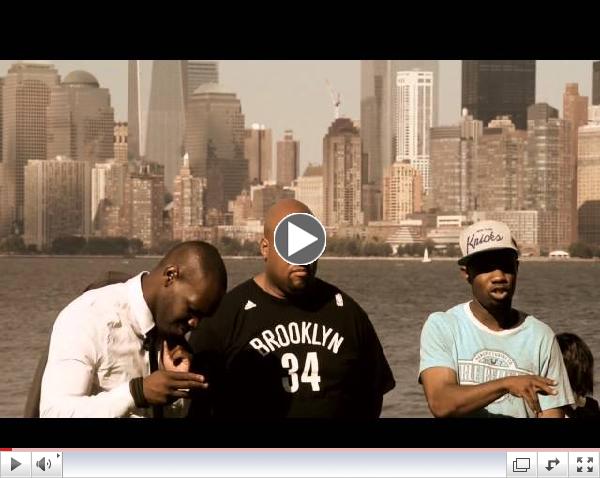 | | Strike! Cablevision techs rap about their struggle for justice on the job with their latest song |
|
Blog of the Week...

|

New CCDS Book Reporting on Vietnam
|
 The new annual edition of our journal of discussion and analysis is now out. More than 170 pages, it includes 14 articles on strategy austerity, organizing, and the right. Cost is $10 plus shipping. Or get one by becoming a sustainer. Click the title to buy it directly. The new annual edition of our journal of discussion and analysis is now out. More than 170 pages, it includes 14 articles on strategy austerity, organizing, and the right. Cost is $10 plus shipping. Or get one by becoming a sustainer. Click the title to buy it directly.
|
|
Radical Jesus:
A Graphic History of Faith 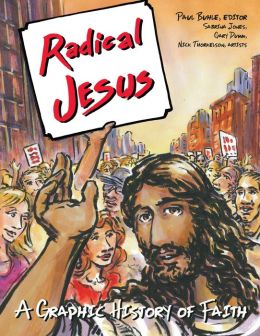 By Paul BuhleHerald Press By Paul BuhleHerald Press
|

Want to Know what CCDS has
been doing...Check it Out!
|
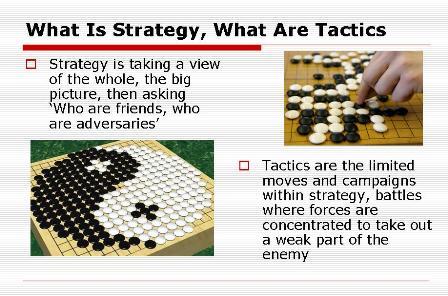 Keep On Keepin' On Keep On Keepin' OnHating the 'Middle Class,' Why Socialists Run in Elections, Strategy and Tactics Slide Slow, Class and Privilege, the Green New Deal ...and other Short Posts on Tumblr by Carl Davidson
|

Edited by Carl Davidson Revolutionary Youth and the New Working Class: The Praxis Papers, the Port Authority Statement, the RYM Documents and other Lost Writings of SDS Changemaker, 273pp, $22.50
For the full contents, click the link and view 'Preview' under the cover graphic.
|
|
By Randy Shannon, CCDS

"Everyone has the right to work, to free of employment, to just and favorable conditions of work and to protection against unemployment."
- United Nations Universal Declaration of Human Rights, December 10, 1948
I. Introduction
The "Great Recession" that began in 2007 has caused the greatest percent of job losses since the Great Depression of 1929. This crisis is the end of an era of unrestrained 'neo-liberal' capitalism that became public policy during the Reagan administration. The crisis marks a new level of instability with the growth of a global financial elite that targeted US workers and our trade unions after World War II.
|
|
Order Our
Full Employment Booklets
 |
...In a new and updated 2nd Edition
Capitalism may well collapse under its own excesses, but what would one propose to replace it? Margaret Thatcher's mantra was TINA...There Is No Alternative. David Schweickart's vision of "Economic Democracy" proposes a serious alternative. Even more fundamentally, it opens the door to thinking about alternatives. His may or may not turn out to be the definitive "successor system," but he is a leader in breaking out of the box. |
 by Paul KrehbielAutumn Leaf Press, $25.64
by Paul KrehbielAutumn Leaf Press, $25.64 | | Shades of Justice Video: Bringing Down a President, Ending a War |
|
 By Giuseppe Fiori
Verso, 30 pages
|

Essays on Mondragon, Marx, Gramsci
and the Green and Solidarity Economies |

- Foreword by Susan Brownmiller
- Preface by Ken Wachsberger
$37.50 + $6 shipping
|
|
Discussion Documents for a Militant Movement

By Don Hamerquist
|
|
|
|
An Invitation to CCDSers and Friends...
 No Warming, No Warming,
No Wars!
We're the Committees of Correspondence for Democracy and Socialism...Do you have friends who should see this? Pass it on...Do you have a blog of your own? Others you love to read every day? Well, this is a place where you can share access to them with the rest of your comrades. Just pick your greatest hits for the week and send them to us at carld717@gmail.com! Most of all, it's urgent that you support low-wage workers, oppose militarized police, the war on Gaza, defend voter rights, plan for 2014 races now, oppose austerity, support the 'Moral Mondays' in North Carolina, the fight for the Green New Deal, a just immigration policy and the Congressional Progressive Caucus' 'Back to Work Budget'! We're doing more than ever, and have big plans. So pay your dues, make a donation and become a sustainer. Do it Now! Check the link at the bottom... |
All Out for the Climate Change March Sept 21!

All CCDS Members and Friends
The most important march to save our planet will take place in New York City September 21st. We urge your fullest participation. The march will be held on the occasion of the UN Summit on Climate Change two days following the march. UN Secretary General Ban Ki Moon will be joining the march along with tens of thousands. Trains, buses and planes will be coming in from all over the country.
CCDS is among more than 1,000 endorsing organizations. Below are March details. For more information and flyers, go to www.peoplesclimate.org.
 This will be an important opportunity to distribute our new CCDS brochure "Change the System, not the Climate." (click here) Look for the CCDS banner and march with our contingent. Check back at this site for details of location to be announced soon.
Call or write Ted Reich of Metro NY CCDS for more information on the CCDS participation:
Cell: 917-701-1835
ted8717@gmail.com  Map of the march route.
The March - 11:30 am, Sunday, September 21st
Assembly location: the area north of Columbus Circle.
March Route:
The march will begin at 11:30 am.
leave Columbus Circle and go east on 59th Street
turn onto 6th Ave. and go south to 42nd Street
turn right onto 42nd Street and go west to 11th Ave
turn left on 11th Ave. and go south to 34th Street
End Location: 11th Ave. in the streets between 34th Street and 38th Street
|
|
|
Six Steps Short of War to Beat ISIS - Phyllis Bennis (The Progressive)
Response to speech by President Barack Obama - Michael Eisenscher, U.S. Labor Against the War National Coordinator
How to Combat ISIS Without War - What President Obama Should Announce: A Plan to Resolve the ISIS Threat without American Bombs (Win Without War)
Six Steps Short of War to Beat ISIS
By Phyllis Bennis
The Progressive
Sept 10, 2014 - Weakening ISIS requires eroding the support it relies on from tribal leaders, military figures, and ordinary Iraqi Sunnis. Here's how to do it without bombs.
President Obama is right: There is no military solution.
Military actions will not set the stage for political solutions; they will prevent those solutions from taking hold.
Escalating military actions against this violent extremist organization is not going to work.
The bottom line is there is no immediate action that will make ISIS disappear, even if U.S. airstrikes manage to get the right target somewhere and take out an APC or a truckload of guys with RPGs or whatever.
You can't destroy an ideology - or even an organization -through bombing (look at the efforts to do so with Al Qaeda . . . lots of members killed in Afghanistan, but the organization took root in a bunch of other countries).
Arming the so-called "moderate" opposition in Syria doesn't mean supporting the good guys. It means sending arms to the Free Syrian Army which, according to the New York Times, "went on to behead six ISIS fighters [2]...and then posted the photographs on Facebook."
A military strike might bring some immediate satisfaction, but we all know revenge is a bad basis for foreign policy, especially when it has such dangerous consequences.
As horrifying as the beheading of the two U.S. journalists was, revenge is never a good basis for foreign policy. We should keep in mind that Matthew Olson, the outgoing head of the National Counterterrorism Center, said last week [3] that "there is no credible information that [ISIS] is planning to attack the United States," and there is "no indication at this point of a cell of foreign fighters operating in the United States - full stop."
Instead, we have to recognize that military solutions really don't work. Have we forgotten the failures of the U.S. wars in the Middle East over these many years?
We need to keep our focus on the medium- and long-term solutions, something not so easy to do in a political year.
We have to recognize that military attacks are not only wrong in a host of ways (illegal in international law, immoral because of civilian casualties, a distraction from vitally needed diplomacy) but also that those strikes are making real solutions impossible.
Why?
We have to start by understanding just why ISIS is so powerful.
First, ISIS has good weapons (mostly U.S. and Saudi weapons that have flooded the region for more than 15 years). So we need to start thinking about the need for an arms embargo on all sides.
Second, ISIS has good military leadership, some of it provided by Sunni Iraqi generals who were kicked out of their positions in the military when the U.S. invaded and who are now providing training, strategy and military leadership to ISIS-allied militias and ISIS itself. These guys are a very secular bunch. They drink and smoke, and they will be unlikely to stick around ISIS if they believe they have any chance of recovering their lost jobs, prestige, and dignity. That could happen over time, but only if a really new government takes hold in Iraq, but it's not going to be enough to simply choose a new prime minister and announce a new government made up of too many of the same old sectarian faces.
Third, ISIS has support from Sunni tribal leaders - the very people President Obama says he wants to "persuade" to break with ISIS. But these are people who have suffered grievously - first during the U.S. invasion, and especially in the years of the US-backed Shi'a-controlled sectarian government of Nuri al-Maliki. They were demonized, attacked, and dispossessed by the government in Baghdad, and many of them thus see ISIS at the moment as the only force they can ally with to challenge that government. And many of them control large and powerful militias now fighting alongside ISIS against the government in Baghdad. ...(Click title for more)
|
U.S. administrations ever since Truman have justified aggressive foreign policies by lying and distorting the realities behind complex international relationships. 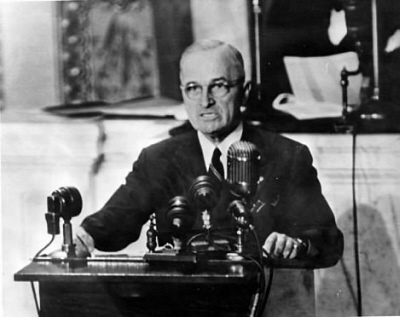 Harry Truman delivers his Truman Doctrine speech before a joint session of Congress, March 12, 1947. Image from American Rhetoric. Harry Truman delivers his Truman Doctrine speech before a joint session of Congress, March 12, 1947. Image from American Rhetoric.
By Harry Targ
The Rag Blog
Sept 4, 2014 - Post-modernists talk about "discourses," "narratives," "tropes," and verbal "deconstructions." They should be commended for suggesting how words are used to mobilize, inspire, deceive, promote self-interest, and, too often, justify killing everywhere.
Former Arkansas Senator, J. William Fulbright in describing how he was tricked by his old friend President Lyndon Baines Johnson to support a resolution authorizing escalating war in Vietnam said: "A lie is a lie. There is no other way to put it."
The story can begin any time. As World War Two was ending, the Greek government constructed by Great Britain after the Nazis were defeated was engaged in an effort to crush a rebellion by activists who objected to their newly imposed rulers. The Greek rebels included former anti-fascists freedom fighters, some of whom were Communists or Socialists. The British, no longer able to support the repression of the Greek Left in what was a civil war, called on the Americans for help.
In February 1947, Truman foreign policy advisers met to discuss what to do about the Greek civil war and the threat of "Communism" spreading along the Mediterranean. The Republican chair of the Senate Foreign Relations Committee, Arthur Vandenberg, attending the meeting. said he would support U.S. military and economic aid for the unpopular Greek government. But, he said, tell the President he better "scare hell out of the American people."
One month later, President Truman gave his famous Truman Doctrine speech to the congress and the American people. He warned the American people, who until that time still had positive feelings toward the Soviet people, that the United States and the "free world" were going to be engaged in a long-term struggle against the forces of "international communism."
The Truman Doctrine was about a global struggle between the forces of good threatened by the forces of evil.
The Truman Doctrine was not about nations and movements with different interests and ideologies but rather a global struggle between the forces of good threatened by the forces of evil.
United States administrations ever since have justified aggressive foreign policies by lying and distorting the realities behind complex international relationships. In addition, when a politician, a journalist, a scholar, or a whole peace movement criticizes targeting nations and movements as diabolical and security threats, these critics are challenged as weak, indecisive, cowardly, and, even worse, stalking horses for the vile enemy or enemies.
Campaigns of propaganda masquerading as truth have been a constant feature of international relations, particularly since World War Two. The reality of U.S. struggles against demonized enemies tells a sobering story. Deaths in wars and interventions in which the United States participated from 1945 until 1995 totaled about 10 million people. These figures, extracted from the valuable research of Ruth Sivard, (World Military and Social Expenditures, 1996) do not include injuries and forced migrations of millions of people fleeing combat zones. Nor do these figures include the wasteful trillions of dollars of military expenditures and environmental damage resulting from a war system....(Click title for more)
|

[Editor: While we don't share the perspective of this piece, the information is worth noting.]
By Tim Devaney
The Hill
July 26, 2014 - Business groups are sounding the alarm over decisions from the National Labor Relations Board (NLRB) that they say would make it easier for small groups of people to create "micro-unions" in the workplace.
The NLRB first recognized the so-called micro-unions in 2011 at Specialty Healthcare, a rehabilitation center, where a group of nursing assistants wanted to organize. Then this week, the labor board endorsed another micro-union, giving a small group of employees at Macy's permission to organize.
Industry groups fear the arrangements could create havoc by forcing companies to bargain with multiple unions at the same work site.
"We are very concerned, because the Specialty Healthcare case, in our view, was just the tip of the iceberg," said Eric Oppenheim, who owns 18 franchise restaurants throughout Maryland and D.C. "Now, they're going to target industries that traditionally were very difficult to unionize."
The rise of micro-unions has all sorts of industries flustered, from restaurants and hotels to grocery stores and manufacturers.
"I think most employers, if they haven't been approached by a micro-union yet, they're definitely waiting," said Amanda Wood, director of employment at the National Association of Manufacturers.
The Speciality Healthcare decision gave unions the ability to, in essence, "gerrymander" a workplace, says Jim Plunkett, director of labor law policy at the U.S. Chamber of Commerce.
"The problem with Speciality Healthcare is not the smallness of the unions, but the way the lines are gerrymandered within a workplace," Plunkett said. "They're allowed to cherry pick the employees in the workplace that they know will be supportive of the union."
Meanwhile, the remaining employees at a workplace can opt to either form their own separate union, or not join one at all, which employers say makes the collective bargaining process all the more confusing.
Labor unions and public interest groups say micro-unions will help level the playing field for employees, so that those who want to organize can do so.
"In most workplaces, business owners have figured out ways to hijack the collective bargaining process," said Keith Wrightson, worker safety and health advocate at Public Citizen. "Workers really do not have any place to turn to."
Employers, on the other hand, "feel like the deck is stacked against them," said Wood.
Many small business owners say they want to create such a good work environment that their employees don't feel like they need a union to negotiate for better pay and benefits.
Other employers are planning more strategic attacks on micro-unions.
Michael Lotito, an employment and labor attorney and co-chairman of the Workplace Policy Institute, said employers could protect against micro-unions by merging a store's different departments so that every worker shares the same responsibilities.
That means at a pizza restaurant, for example, employees would take turns driving the delivery car, making pizzas, serving customers, and cleaning the tables, Lotito said....(Click title for more)
|
Ferguson, the Black Radical
Tradition and the Path Forward
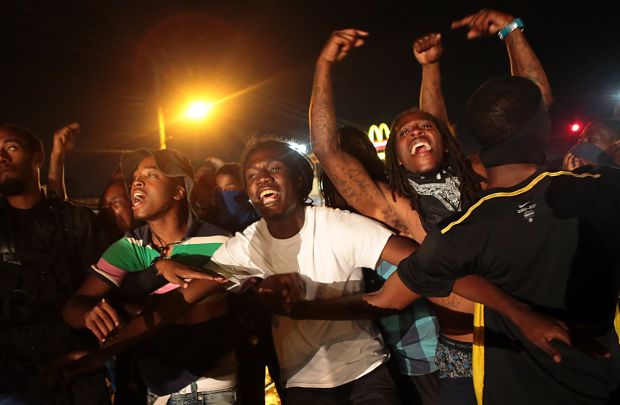
By Sundiata Keita Cha-Jua The Black Scholar
Aug 26, 2014 - Can't you feel it? Feel the temperature dropping? Feel the icy winds blowing? It's winter in America. Spring and fall seem to have enveloped summer. The chill comes sooner and lasts longer. It's winter in America. There's a blizzard coming.
The first frost has already fallen, in Ferguson, Missouri, of all places. Ferguson has ripped the veil off. It is now clear for the world to see how the U.S. plans to deal with its black internal colony.
It's getting dark; it's nearly midnight. Yes, repressive episodes will continue to increase in frequency and grow in intensity. It's nearly midnight. However, we should not despair. Enveloped in the darkness, the repressive U.S. regime of racial control has been exposed by the black light of African American youth rebellion and more importantly, through their defiance we can see the silhouette of a new era emerging. Don't fear the dark. Dawn begins at midnight; midnight is "the first minute of a new day."
I am of course referencing Gil Scott-Heron, the Black radical griot, second-generation political rapper (Langston Hughes and Oscar Brown Jr. first generation) and self-proclaimed "bluesician". Our children are maturing in Ferguson; they are not only challenging the State, but as importantly, they are also defying the decrepit civil righters. A new movement is being born in the darkness of Ferguson, Missouri.
The new reality, the new nadir has established the structural conditions for the birth of a new movement. We need to supply the consciousness. "Each generation must, out of relative obscurity, discover its mission, fulfill it, or betray it" according to Frantz Fanon (Frantz Fanon, The Wretched of the Earth New York: Grove Press, 1969, 206).
Each generation creates new organizations, associations that address the problems they confront, that speak their language; that expresses their style and articulates their analysis and understanding of the path forward. The NAACP in the early 20th century, the National Negro Congress during the Great Depression, the Southern Christian Leadership Conference in the 1950s, the Student Non-Violent Coordinating Committee in the early 1960s, the Black Panther Party in the late 1960s, etc. This process of generational organizational formation appears to be occurring before our eyes. However, it is the dark of night, so we cannot see clearly, but however dimly, it does seem that in Ferguson, Missouri, Black generation Xers are discovering their mission.
Am I glorifying the looting, burning and indiscriminate shooting? No! Do I condemn it? Do white Americans condemn the actions of the Sons of Liberty? Do I condone it? I neither condemn nor condone it. I recognize it as an expression of working class African American youth, men and women, struggling to find their voice and discovering that actions speak louder than words.
The Ferguson rebellion is an inchoate manifestation of the roiling turbulent dark water of African American resistance to white supremacy and capitalist exploitation. Will it become more? Will the young activists become politically conscious and organized? Will the youth whose dogged strength has kept the rebellion alive transform themselves into radicals and their struggle into a battle for power? It's unclear; therefore, I don't condemn it. It's too soon to tell what it means in the flow history.
However, professor Ashley Howard reminds us that what's been called riots are merely the tactics of the most marginal and alienated sectors of Afro-America. Ferguson is inspired by the same conditions and in embryonic form harkens back to Harlem 1935, Los Angeles 1965, Miami 1981 and Los Angeles 1992. At this point it is less destructive. Perhaps, it is a more organized manifestation of African American urban rebellion. Possibly, it signals the maturation of urban working class Black youth....(Click title for more)
|
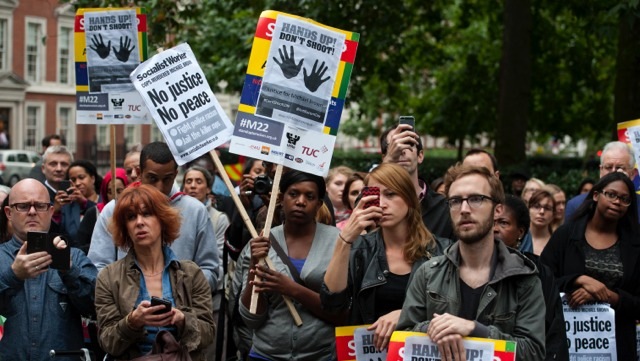
Until racism is addressed, a more humane social contract is unattainable.
By Frank Joyce
Alternet
Sept 8, 2014 - The first abolition struggle arose to oppose slavery. For the most part, it did not challenge the idea of white supremacy. It did not advocate for racial equality. It sought the end of chattel slavery. Period. The second developed to abolish the Jim Crow version of apartheid that replaced slavery.
Despite the heroic efforts of blacks and whites to end slavery and Jim Crow, the system of racism and white privilege kept right on going. Like a virus, it evolved and adapted. How do we know that? Racially measured inequality in health, income, wealth, education, incarceration, housing and other measures still define our society. Many disparities are as big now, or worse, than they have been in the past.
Never yet has there been a movement to abolish racism itself. Now is the time, not just because there is a crisis. Surely there is a crisis. But while it might not seem obvious, there is also new opportunity.
Many whites continue to believe that racial disparities persist because African-Americans are inferior and therefore deserving of their "second-class" status. That view is racist pure and simple. The more "liberal" perspective is that inequalities persist because of the "legacy" of slavery. That's not accurate either.
Why? Global race-based capitalism is not a system of the past with lingering effects. It is a living, breathing organism of the present. White racism is as much a part of our structure in 2014 as "free markets," private property, the jury system, cable TV, Major League Baseball, representative democracy and the Second Amendment.
Thanks to the work of historian Gerald Horne, especially his most recent book, The Counter-Revolution of 1776, we have a much better understanding of how thoroughly the creation of the "first apartheid state" set the course we are still on more than 200 years later. Well beyond the nefarious "three-fifths of a man" so-called compromise language in the Constitution, the nation's core document institutionalized white privilege.
White racism will not just "wither away." It surely will not disappear just because whites become a minority. It cannot be dismissed into oblivion by calling any discussion of it "playing the race card," or repeating loudly and frequently that it is "in the past."
Neither will it be eliminated in the course of achieving liberal political objectives such as the Affordable Care Act or "comprehensive immigration reform," the decriminalization of marijuana or a reduction in the size of the prison population. Indeed it is the other way around. Until racism is addressed a more humane social contract is unattainable.
"Talking" About Race versus Opposing Racism
It's amusing to hear recurring calls to "talk" about race. Don't we already do that a lot? How could it be otherwise given that our society has spent the last 500 years perfecting the concept of "whiteness."
So it's no wonder that the identity difference between white and black is more evident today than ever. It is in music, dress, how people name their children, politics and everything else. Extensive research verifies that we register skin color in all of our interactions, silly claims to being "post-racial" notwithstanding.
Race is intrinsic to the way the brains of US citizens are conditioned by schools, media and custom to mentally organize the world. Otherwise, why would it even matter to call Barack Obama our "first black president." Why would there be a Black Entertainment Network? Why would anyone care that Fox News or Duck Dynasty or Donald Sterling or Cliven Bundy were there to express and reinforce the stereotypes that are essential ingredients of white privilege and white supremacy? ...(Click title for more)
|
 Bob Dylan In New York City Before Anyone Knew Him: The Year of Wine, Women, Song and Protest Bob Dylan In New York City Before Anyone Knew Him: The Year of Wine, Women, Song and Protest
Bob Dylan at Gerde's Folk City in Greenwich Village in 1961.
By Dennis McNally
Counterpoint Press
Sept 3, 2014 - (What follows is an excerpt from the forthcoming book by Dennis McNally, On Highway 61: Music, Race and The Evolution of Cultural Freedom (Counterpoint, 2014) which traces the culture and history of American music from Old South through the 1960s. It will be available October 14.)
...Naturally, Dylan went straight to Greenwich Village. The Village had been receptive to folk music at least since the Almanac Singers had lived on West Tenth Street, and it was a genuine community. It wasn't about money, he'd write a couple of years later. "Instead a bein drawn for money you were drawn / for other people."
Soon Bob hooked up with a blues player named Mark Spoelstra, and they worked at the Café Wha? as a duo in the afternoons. Before long he was playing other basket houses (so-called because the only pay came when someone passed a basket around the audience), often three or four in a day, working from noon to 2:00 or 3:00 a.m. He began to develop a hip, funny stage act that went along with the songs. He also played anywhere else that would let him unpack his guitar, especially at parties and at Israel "Izzy" Young's Folklore Center.
He had a voice-not a conventional voice, not the sweet voice of Minneapolis, but what one of his biographers called "a tonsilly scranch, a dry, throaty tenor, 'with all the husk and bark left on the notes.'" He also had a persona as a baby Woody Guthrie, and he was always in character. His closest friends weren't sure if he was playing Woody or being himself-ultimately, he was always inscrutable-until after a while, it was clear that he'd become what he imagined.
The bluesman Big Joe Williams would say of Dylan, "Bobby didn't change, he just growed." Quite so. Small, baby-faced, and charming yet ravenously ambitious, he was no innocent, but full of what Raymond Chandler called "the hard core of selfishness which is necessary to exploit talent to the full." He grew famous for spinning fantasy tales about his past that weren't entirely lies but what Andrew Loog Oldham meant when he wrote, "It wasn't an act, even if it was."
He was also at heart a moralist, very much part of the world of the songs he sang, "hard-lipped folk songs with fire and brimstone servings," as he wrote later. "They weren't friendly or ripe with mellowness . . . They were my preceptor and guide into some altered consciousness...(Click title for more)
|
By Moira Herbst
Al Jazeera via Portside
 Sept 1, 2014 - The playwright, theorist and poet Bertolt Brecht is known worldwide as a giant of modern theater. But until recently, few theaters - especially in the U.S. - have been staging his plays. Production companies haven't seen much of a market for the Marxist playwright's overtly political style and have generally stuck with more familiar, accessible works. Sept 1, 2014 - The playwright, theorist and poet Bertolt Brecht is known worldwide as a giant of modern theater. But until recently, few theaters - especially in the U.S. - have been staging his plays. Production companies haven't seen much of a market for the Marxist playwright's overtly political style and have generally stuck with more familiar, accessible works.
That's starting to change. Since last year, Brecht suddenly seems to be everywhere. In New York alone, we've seen productions of "The Good Person of Szechuan," "A Man's a Man" and "The Threepenny Opera [1]," which has also been performed in Long Beach, [2] California; Washington, D.C. [3]; and Yorkshire [4], England. A production of "The Good Person of Szechuan" helmed by renowned Chinese director Meng Jinghui just finished a run in Australia [5]; another just wrapped in New Zealand [6]. "Galileo" is running in Santa Monica [7], California. Other Brecht plays have recently been staged in London [8] and Dublin [9], and "Mother Courage and Her Children" - Brecht's meditation on war and war profiteering - has recently been performed in Paris, London, Ontario and, reportedly, Iran [10].
Two Brecht biographies [11] have also been published this year - the first in English in two decades - along with a volume of love poems [12] and letters translated for the first time. Brecht is also penetrating the hipster-intellectual scene; he's recently been the topic of a TED talk [13] and a video [14] featuring actress Tilda Swinton.
Brecht is back
It's not hard to see why Brecht is back, especially in the U.S. His main subjects were inequality, squalor, exploitation and the malleability of human nature. Since his death in 1956, the capitalism he critiqued has only become more sophisticated, entrenched and global. With inequality at a post-Depression high [15] in the U.S., poverty inescapable for many, power concentrated in the hands of a few and the promise of social mobility all but lost, 2014 America bears many parallels to the interwar Germany [16] that Brecht once called home.
The 2008 financial crisis and its aftermath opened the door to ideas that previously seemed outdated or too radical. For the first time in generations, Americans were shaken into doubting the capitalist system, which seemingly served the country well for so long. After the mortgage bubble burst, 401(k)s and household wealth were eviscerated, taxpayers bailed out megabanks and the economy began to hemorrhage 8.7 million jobs [17], many Americans understandably lost faith.
Such shattering of America's collective illusion about the safety, soundness and fairness of its capitalist system sparked an ongoing dialogue about who wins and who loses if we maintain the status quo. The 2011 Occupy Wall Street movement, which tapped into such disillusionment, may have fizzled, but its ideas live on. We have entered an era of widespread skepticism of systems and practices that we are told are good for us - budget cuts and austerity, the expansion of the tech industry and all its disruptions, antiterrorism efforts (including mass surveillance) and a once again rising stock market. More Americans are losing confidence [17] in our economic system and in the political leaders [18] who uphold and preserve it.
Cue Brecht's re-entry onto the theater scene. Born in Bavaria in 1898, Brecht became a Marxist in his late 20s. He was forced into exile by the Nazis in 1933 and for 15 years lived as a man without a country. He worked in Hollywood for two years until he was interrogated about his alleged communist sympathies by the House Committee on Un-American Activities in 1947. Shortly after that, he moved to East Germany.
Wherever he was, Brecht's mission was to - through theater - lay bare the contradictions inherent in capitalism and the brutality and human exploitation within both capitalist and fascist systems. He wanted to activate audiences, to spur them not to suspend their disbelief by becoming absorbed in the plot and identifying with characters' emotional journeys but to think critically about what they viewed onstage. He wanted audience members to engage with the play and, by extension, their daily lives under capitalism. Active participants would replace passive consumers. ...(Click title for more)
|
|
Keep up with the Moral Mondays with a Red Resolution...
Become a CCDS member today!
 The time is long past for 'Lone Rangers'. Being a socialist by your self is no fun and doesn't help much. Join CCDS today--$36 regular, $48 household and $18 youth. The time is long past for 'Lone Rangers'. Being a socialist by your self is no fun and doesn't help much. Join CCDS today--$36 regular, $48 household and $18 youth.
Better yet, beome a sustainer at $20 per month, and we'll send you a copy of Jack O'Dell's new book, 'Climbing Jacobs Ladder,' drawing on the lessons of the movement in the South in the 1950s and 1960s.
Solidarity, Carl Davidson, CCDS
|
|
|